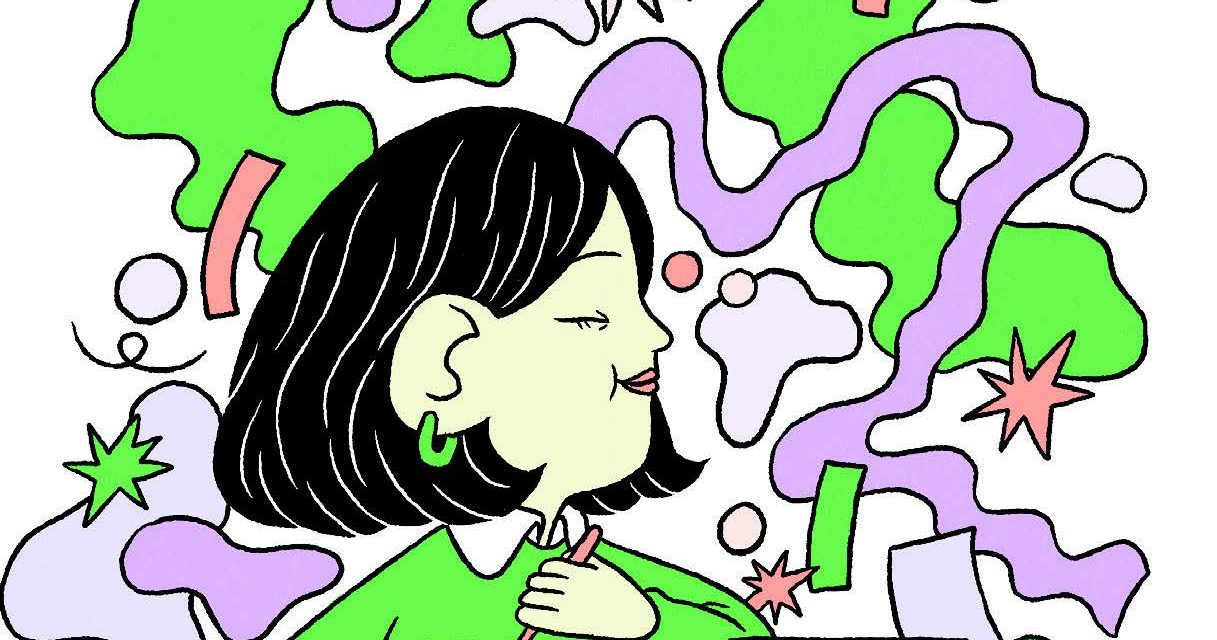
The Joy of Creating

Advice Received As A Young Girl Helps Grace Chan Mckibben ’86 Weather The Hard Times.
I pulled out the basket of chunky yarn tucked into a corner of my living room and began to knit. My mind, still reeling from a full day of Zoom meetings, soon began to settle into the rhythm of the stitches I was forming with my giant knitting needles: knit, purl, knit, purl. The repetitive motion quieted my mind and focused my attention on the blanket I was making.
After adding a few rows to my knitting, I set it aside and went back to work on my computer.
One of the strongest memories I have of growing up in a Catholic school in Hong Kong is Friday morning assembly. Sister Jeanne Houlihan, the school principal, always had a word of wisdom to share with the students. Tough and inspiring, but warm and caring, Sister Jeanne would have made a great priest or politician in a different life. But for several generations of students at Maryknoll Convent School, she was mother, leader, counselor, and confidant all rolled into one.
A Friday assembly address that I remember most vividly was Sister Jeanne telling us that whenever we felt alone, or sad, or frustrated, we just needed to do something creative, whether it was writing a poem, baking a cake, or drawing a picture. “Doing something creative activates a different part of your brain,” Sister Jeanne said, “and believe me, you will feel better afterwards, and be able to get on with what you have to do next.”
All these years later, I have taken this practical advice to heart. When I get stuck working on a spreadsheet, or a grant proposal is rejected, or I’m frustrated after a difficult meeting, I often turn to the various craft projects I have in progress— or I bake a cake or play the piano.
The year 2020 has been challenging for many. For me, the year started with my father passing away suddenly one January morning in Hong Kong. A hard-working and principled man, my dad was my hero. Like other Chinese fathers, he usually expressed his love in practical help. While we didn’t always agree, dad was unwavering in his support of his children. He was a naturally talented artist who could pick up a pencil and quickly draw anything. When I was little, he was the parent who helped the children finish art projects, especially me, the least artistic of the children. Many times this year I found myself thinking about my dad and feeling sad. Often I would turn to my kindergarten- level doodling to remind myself of him and to try just a little harder to develop my artistic skills.
The year 2020 has been difficult for my work life as well. I lead a policy and advocacy organization whose mission is to civically engage the immigrant community in Chicago’s Chinatown and to amplify the community’s voice and power. Early in 2020, fueled by fear of the coronavirus and the negative rhetoric from politicians, anti-Asian sentiments resulted in a significant loss of business in Chinatown. As covid-19 raged on, our office shifted to remote work. This made outreach and engagement even harder, as we struggled to overcome barriers imposed by technology, language, and governmental structures. We needed to help our community access assistance programs, participate in the decennial census, and learn how to vote remotely.
Between Zoom meetings, I made some impressive-looking sourdough bread and cupcakes and also finished more rows of the chunky yarn blanket.
The pandemic has shown us that the systems we have relied on are fragile. In the middle of being isolated and anxious, creativity provides a way for us to make practical meaning out of life. Whether it’s making music or cooking, the creative process taps into our inner reserves, our human ability to make something beautiful out of nothing. It also takes us away from our immediate concerns and gives us hope. A difficult year, 2020 was also a year when we made new things out of old ingredients, and I look forward to more new creations in 2021.
GRACE CHAN MCKIBBEN ’86 IS EXECUTIVE DIRECTOR OF THE COALITION FOR A BETTER CHINESE AMERICAN COMMUNITY, BASED IN CHICAGO’S CHINATOWN.




